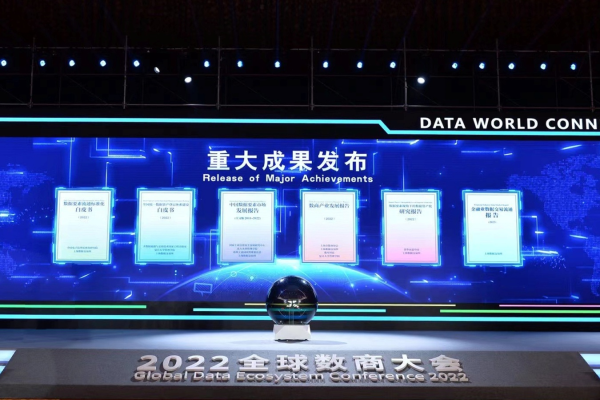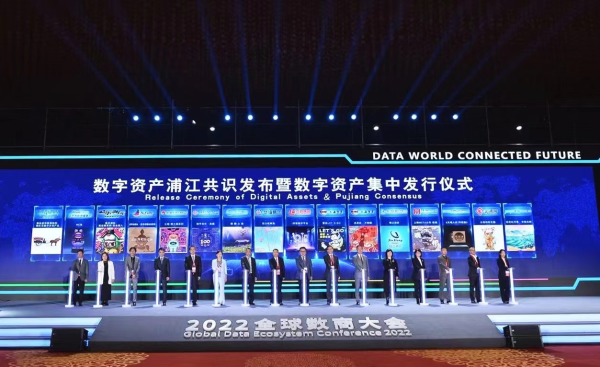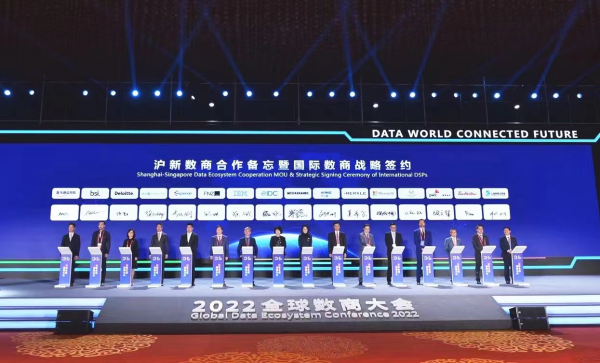Data ecosystems are gaining momentum, data’s value is being released, and the digital economy is prospering. The Global Data Ecosystem Conference 2022 kicked off in Shanghai on Nov. 25 with the theme of “Data Ecosystem Connects the Globe and Leads to the Future.” The conference inaugurated the Shanghai Data Ecosystem Association, unveiled the development scheme for the data factor industry cluster, initiated the Pujiang Digital Assets Consensus, premiered globally major demonstration projects of the data factor market, and reached a global consensus on the International Data Exchange Partnership Shanghai Initiative.
The conference was hosted by the Shanghai Data Exchange, co-hosted by Yicai Media Group, and co-sponsored by SGTech, the Western Digital Trading Center, the Shenzhen Data Exchange, and the Anhui Big Data Trading Center (to-be-established) under the guidance of the general office for the Shanghai digital transition working group. The conference was held both online and offline in the form of metaverse and with the theme of “Data Ecosystem Connects the Globe and Leads to the Future.” It held an opening ceremony and one main forum, one data trading festival, as well as 20 theme forums in Shanghai, Singapore, Shenzhen, Chongqing, and Hefei, organized more than 100 keynote speeches, roundtable discussions and important events, invited over 200 guest speakers, more than 500 data ecosystem firms, and over 10,000 professional visitors to participate in the conference online and offline.
First International Partnership Initiative, Shanghai Sends Data Exchange Invitation to the World
15 Chinese and foreign institutions, including the International Data Spaces Association, the Data Asset Management Association, the Singapore Trade Data Exchange, the British Standards Institution, the China Information Technology Industry Federation, and the Shanghai Data Exchange jointly released the International Data Exchange Partnership Shanghai Initiative at the conference, which is an important move by Shanghai to execute the G20 Digital Economy Development and Cooperation Initiative and further international cooperation. The initiative aims to make objects of data exchange more diversified, trading rules more transparent, and data ecosystems more prosperous, proposes to together create a new data exchange mode, discuss new data exchange rules, and build new data ecosystem development ecology, enables Shanghai’s voice to be heard in international cooperation on the digital economy, and promotes the orderly international flow of data factors.
Shanghai-Singapore Cooperation Opens Up a New Track, Singapore and Shanghai Join Hands to Boost Data Ecosystem Development
The conference has a sub-forum in Singapore to follow the Digital Economy Partnership Agreement (DEPA), the Comprehensive and Progressive Agreement for Trans-Pacific Partnership (CPTPP), and other high-standard trade rules, hold high the banner of international opening-up and cooperation, make data flows key carriers and drive engines for global technology and capital flows as well as trade logistics. Shanghai and Singapore penned a Memorandum of Understanding on the data ecosystem, aiming to form a specialized platform for international data ecosystem exchange, provide a channel for sharing resources for bilateral cooperation, and create new market opportunities for data exchange.
The Shanghai Data Exchange inked an International Data Ecosystem Business Strategy Memorandum with world-leading companies such as Amazon Web Services, The Dun & Bradstreet Corp., KPMG, and Ocean Tomo at the conference to hike joint efforts with top international institutions on data development, data exchange and building data ecosystems, and hike Shanghai’s capacity of global allocation of data factor resources.

The Web3.0 Era’s Value Chain is Unveiled with Pujiang Digital Asset Consensus Published
At this conference, well-known companies at home and abroad, as well as representatives of Shanghai state-owned enterprises, jointly released the Pujiang Digital Asset Consensus. Digital assets are non-monetary assets that exist in digital form, focus on innovation, and are expected to bring economic rewards. As the first consensus document advocating the healthy development of digital assets in China, the Consensus innovatively defines the “four prohibitions” and “five permissions” for digital assets. Adhering to the bottom line, it clearly delineates the code of conduct to respect originality, protect rights and interests, and prevent risks. Inevitably emerging from the digital economy era, digital assets are a bridge for the deep integration of digital technology and the real economy, and an important measure for China to cultivate new competitive advantages in the digital economy for the future. The release of the Consensus not only demonstrates the agreement of all sectors to actively embrace digital assets and strive to open a new track of “integrating digital technologies with the real economy,” but also shows Shanghai’s determination to build an “international digital metropolis” having an open, innovative and inclusive attitude.
Among the digital assets issued at the meeting, there are new and well-established state-owned brands, including time-honored brands in the city, such as “Lei Yunshang” and “Dragon Tiger” of Shanghai Industrial Investment (Holdings), “Three Guns” of Orient International (Holding), “Buddha’s Hand” of Bright Food (Group), “Warrior Shoes” of Huayi Group, “Jin Jiang Hotel” of Jin Jiang International (Holdings), as well as new brands of state-owned assets system, such as “Zhiji” of SAIC Group and “Bailian Omni-channel” of Bailian Group.

Zhangjiang District Defines Shanghai’s Data Factor Industry Cluster
Developing the digital economy and cultivating the data factor market are innovative and important parts of Shanghai’s comprehensive promotion of urban digital transformation and establishment of international digital capital. Following the trend, Pudong New Area officially released the construction plan for Zhangjiang Data Factor Industry Cluster and launched a series of supportive policies on data transactions. As the first data factor industry cluster plan going through data production, exchange and consumption, it stipulates that Pudong explores the concentration of data collection, the breadth of resource allocation and the speed of industrial development around the spatial layout of “one core, three parks and two ports.”
Meanwhile, Pudong New Area launched innovative measures to boost the data trading market for the first time, attracting digital businesses with the policy gift package. The authority smooths the whole data chain from products to commodities, rewards companies for the first data products, and offers a one-time reward of no more than CNY200,000 (USD27,940) after the data transaction amount reaches a certain level, so as to best promote the data factor industry with sound measures.
Shanghai Speeds Up Building “Four Girders and Eight Pillars” of the Data Factor Market with Significant “6+6” Accomplishments Coming Out Globally for the First Time
As an important city for domestic data trading, Shanghai has previously formed a number of theoretical and institutional achievements in all aspects of data factor exchange. During this conference, these results were also released, including the six major achievements and six demonstration projects unveiled to the world for the first time.
Among the six major achievements, the White Paper on Standardization of Data Factor Exchange builds a general framework for data factor exchange, which focuses on the status of policies and regulations, systems and models and technical standards, and lays the foundation for building a standard system for data factor exchange in China. The White Paper on Construction of National Unified Data Asset Registration System is based on the overall development of the data factor market and proposes the “Seven Uniform” principles, namely, unified registration basis, unified registration agency, unified registration carrier, unified registration procedure, unified review rules, unified registration certificate, and unified registration effectiveness. The China Data Factor Market Development Report measures for the first time the contribution of data factors to economic value and the marketization index of China’s data factor, and reviews and concludes the development trend of China’s data factor market with a comprehensive and multi-aspect point of view. The Data Ecosystem Industry Development Report is the first national overview of the potential of the data ecosystem in China, which provides an in-depth analysis of the competitiveness and growth capability of the data ecosystem. The Data Capitalization Research Report from the Perspective of Data Factor puts forward the practical path of data capitalization for the first time and explores the establishment of a data asset value assessment method based on orderly market transactions. The Financial Industry Data Exchange Market Research Report is the first report based on detailed transaction data and discloses the knowledge map of data exchange in China’s financial industry.
The conference also launched six key demonstration projects, namely standardized pilot data exchange projects, a data asset registration platform, a Shanghai portal for data management maturity service, a China data factor market development index, a cross-chain digital asset mutual trust laboratory and a Shanghai data exchange chain.

The First National Data Ecosystem Association Was Officially Announced at the Conference to Further Improve the Data Ecology
The first national data ecosystem association was officially announced at the conference. The association focuses on the better development of the data factor market and has attracted more than 200 institutions from finance, shipping and transportation, communication, industry, Internet, compliance assessment, energy and other sectors to join. The association will further bring into play the cluster effect and serve as a bridge between the government and enterprises, promoting the construction of a new industry and new ecology of the data factor market, and supporting the development of the industry.
Shanghai Data Exchange Festival Kicked Off, 10,000 Firms in 15 Cities Held “Data Ecosystem Activities”
As an important part of creating the ecology of the data ecosystem, the conference created the Data Exchange Festival. As the first data exchange event in China, many outstanding data traders assembled at the festival. Eight awards were unveiled, including data exchange institution of the year, data product of the year, data asset innovation of the year, leading data ecosystem enterprise of the year, leading data ecosystem figure of the year, international data ecosystem of the year, and data ecosystem industry ecology of the year. In the one-month Data Exchange Festival, Shanghai will increase training and subsidies, focus on organizing onsite data exchange contract signings, and carry out “digital ecosystem activities” in 15 cities across China, including Beijing, Tianjin, Xi’an, Shanghai, Nanjing and Hefei.
Exploring the Fundamental System of Data, Six Themes and 20 Sub-Forums Discussed the Road Map of Data Factor Market
The conference had 20 sub-forums under six themes, namely, “Basic Institutional Theories for Data Factors,” “Laws, Standards, Rules for Data Factors,” “Data Factor Exchange Ecosystem,” “Key Technologies for Data Factor Circulation,” “Data Factor Asset Practice” and “Global Cooperation of Data Factors”, with 100 top industry experts discussing the “Shanghai Road Map” for data exchange. The forums enabled the industry to have a deeper understanding of the new situation, new technology, new ecology and new path in the development of the data factor and helped to build an industry benchmark for results releases, hot topics and trends in the data field worldwide.
Media Contact
Company Name: Yicai Media Group
Contact Person: Jiawei Qian
Email: Send Email
Country: China
Website: https://www.yicai.com/
